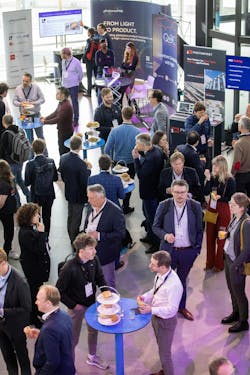Scaling photonics innovation: What we learned at the PIC Summit
The scale of the PIC Summit Europe underscored both the meteoric rise of photonic chips and the critical juncture the industry now faces. Across keynotes and panel discussions, experts explored how to propel the sector forward, focusing on cross-border collaboration, process standardization, and removing barriers that impede progress. The attendance was broad, but the message was consistent: Integrated photonics has the potential to revolutionize industries and address global challenges, but unlocking this promise will require a holistic approach driven by cooperation among diverse stakeholders across regions and sectors.
A collaborative vision for integrated photonics
A recurring theme throughout the summit was the necessity of a holistic, cooperative approach to developing the integrated photonics industry. Without this, the sector risks falling short of its significant potential. Stakeholders from diverse industries and nations need to align on standards, infrastructure, and legislation to foster seamless integration and scalability.
The transformative promise of photonic chips extends across numerous sectors—from healthcare to agriculture—and offers solutions to pressing challenges like climate change and supply chain security. Realizing these benefits on a global scale demands a foundation built on robust production ecosystems, well-aligned regulations, and substantial investment. These fundamentals dominated the summit’s panels, speeches, and debates, as leaders sought consensus on the path forward.
Europe’s role in the global photonics landscape
In a keynote address, Gustav Kalbe, acting director for enabling and emerging technologies at the European Commission, reiterated the importance of integrated photonics to Europe’s economic future. He emphasized that the European Union’s (EU) commitment to innovation would be a key focus under the Commission’s new mandate starting in December 2024, as outlined in the Draghi Report on Europe’s industrial potential.
Kalbe stressed that fostering collaboration—both among EU member states and across industries—is essential to maintaining Europe’s competitive edge. He also highlighted the EU’s Chips Act as a promising step toward harmonizing regulations and promoting innovation. But the summit made it clear that a more unified approach is required to compete with global powerhouses like the U.S. and China, which benefit from a large home market, centralized government and regulations, and substantial public and private funding.
Funding and scaling remain a persistent challenge
While photonic chips hold tremendous promise, scaling from prototype to mass production is costly and complex. Unlike software-driven industries like fintech, which can rely on existing digital infrastructure, integrated photonics requires an entirely new supply chain and manufacturing ecosystem.
One notable example of progress is PhotonDelta, which received €470 million ($493M) from the Netherlands’ National Growth Fund and €630 million ($661M) in private funding in 2022. This investment has fueled the development of a Dutch integrated photonics supply chain and supported international expansion, including a U.S. hub. Replicating such initiatives across Europe will require a surge in both public and private funding and closer ties to the semiconductor industry.
The call for standardization
Industry leaders, including representatives from IBM, NVIDIA, Nokia Bell Labs, and Sony, highlighted the need for standardized manufacturing and design processes. Standardization would enable faster scaling and broader adoption of photonic technologies across multiple sectors—ensuring that photonics is not confined to niche applications.
Compared to competitors like the U.S. and China, Europe faces additional hurdles in achieving regulatory alignment across its many jurisdictions. Without a cohesive strategy, the EU risks losing its competitive edge in this rapidly evolving field. Summit attendees agreed that creating long-term roadmaps and standardized frameworks is crucial to overcoming these obstacles.
Integrated photonics and AI: A shared future
The intersection of integrated photonics, artificial intelligence (AI), and quantum computing emerged as a hot topic at the summit. Photonic chips are expected to play a pivotal role in advancing AI by enabling more efficient and powerful computing systems. Attendees recognized the opportunity for collaboration among these interconnected industries, which are all at early stages of development but share a common goal of technological transformation.
Bridging the skills gap
As in many tech sectors, the integrated photonics industry faces a significant skills gap. A shortage of skilled professionals threatens to hinder long-term growth and innovation. Addressing this issue will require concerted efforts from governments, academia, and industry to attract and train talent.
At the summit, PhotonDelta announced an initiative to promote careers in integrated photonics, aiming to build a pipeline of skilled workers. But broader action is needed—such as incentives to boost STEM education, targeted training programs, and strategies to upskill existing professionals. Only a unified effort will secure the human capital necessary for the sector’s success.
A growing summit reflects a maturing industry
Now in its third year, PIC Summit Europe has grown from a niche event into a significant gathering of global industry leaders. Discussions have evolved from addressing specialized technical challenges to shaping ambitious, long-term visions for integrated photonics.
This year’s event demonstrated how far the sector has come in a short time, with increasing recognition from governments and major corporations. But it also highlighted the critical work ahead to translate consensus into actionable outcomes. Collaboration, standardization, investment, and workforce development will be essential to ensure that the industry can fulfill its transformative potential.
As the summit concluded, there was a palpable sense of momentum. Leaders left Eindhoven with a shared determination to turn discussions into progress. The journey ahead may be complex, but the foundations for a thriving, sustainable integrated photonics industry in Europe are stronger than ever.
Related Content
About the Author

Eelko Brinkhoff
Eelko Brinkhoff has been CEO of PhotonDelta since February 2024, having previously worked for 25 years in economic development. PhotonDelta is a leading international ecosystem for integrated photonics based in the Netherlands, and Eelko's role involves maturing the organization after a period of rapid growth.



